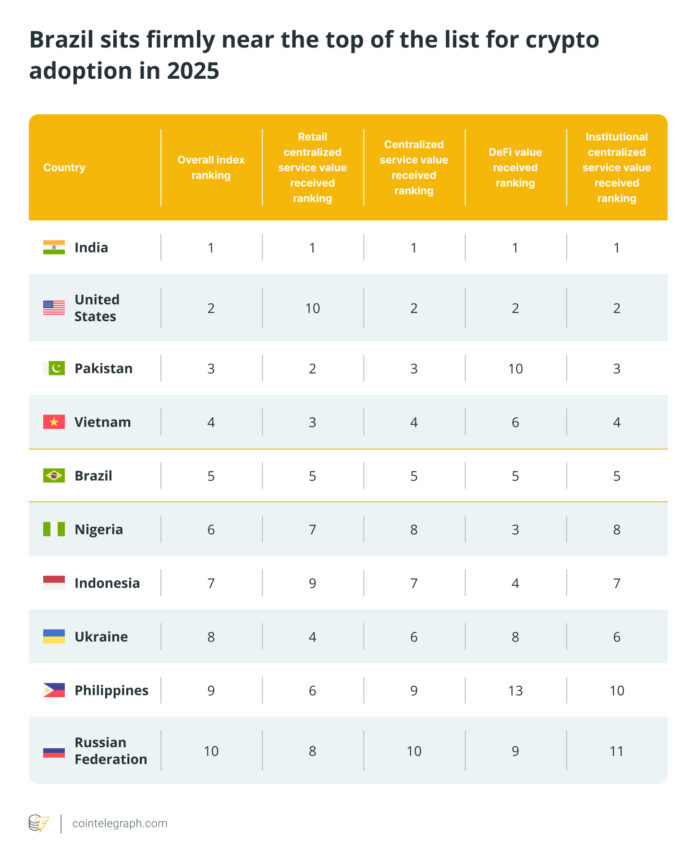Introduction to Brazil’s Bitcoin Adoption
Brazil has been making significant strides in the adoption of Bitcoin, with the country ranking at the top for cryptocurrency adoption in 2025. The nation’s Ministry of Finance and Central Bank are not adding Bitcoin to the country’s government reserves, nor is there a law requiring government entities or state-owned companies to hold Bitcoin (BTC). Instead, a patchwork of city initiatives, listed companies, and new market infrastructure are driving this growth.
Brazil’s most important stock exchange, B3 (Brasil, Bolsa, Balcão), has been at the forefront of this development. Created in 2017 through the merger of the securities, futures, and commodities exchanges of São Paulo, B3 is one of the largest market infrastructures in the world and the first in Latin America to list a spot Bitcoin exchange-traded fund (ETF).
Key Developments in Brazil’s Bitcoin Market
Brazil has spent the last few years developing regulated, trusted ways to access Bitcoin. In 2021, B3 listed Latin America’s first spot Bitcoin ETF (QBTC11 by QR Asset), providing institutions with an auditor-friendly vehicle without the need for self-custody from day one. Derivatives followed, and in mid-2025, B3 reduced the size of the Bitcoin futures contract from 0.1 BTC to 0.01 BTC to expand participation and improve hedging.
Product innovation has kept pace, with asset managers launching hybrid funds on B3 that combine Bitcoin and gold. The rules and regulations have matured in parallel with the products, with the Central Bank publishing detailed standards for Virtual Asset Service Providers (VASPs) in areas such as licensing, Anti-Money Laundering/Combating the Financing of Terrorism (AML/CFT), governance, security, and consumer protection.
Why Brazilian Treasurers Are Turning to Bitcoin
Financial teams are trying to smooth gains and protect purchasing power in a market where the Brazilian real can fluctuate wildly due to political decisions and external shocks. A small allocation of Bitcoin held across audited instruments, alongside dollars and local banknotes, provides liquid, non-sovereign backing without the need for new custody operations.
Using familiar tools is also a key factor, as spot ETFs and exchange-traded futures on B3 allow treasurers to size, rebalance, and hedge within the same governance and audit routines they use for other assets. The smaller 0.01 BTC futures contract makes treasury-level hedging more precise and cost-effective.
Risks and Mitigants
Brazil is aware of the risks associated with Bitcoin adoption and is taking steps to address them. Market volatility, operational and counterparty risk, legal and enforcement clarity, and public optics and disclosure are all being addressed through regulatory measures and the development of new products and standards.
The central bank’s new VASP standards, which come into effect in February 2026, will push crypto intermediaries towards traditional financial norms, reducing operational uncertainty for treasurers. A new bill would allow financial institutions to liquidate seized cryptocurrencies, aligning treatment with foreign exchange and securities processes and reducing gray areas in enforcement.
Lessons for Other Nations
Other countries can learn from Brazil’s approach to Bitcoin adoption. Writing clear rules, introducing easy access products, downsizing derivatives to support hedging, and enabling the development of disclosure standards in public markets are all key steps in facilitating the use of Bitcoin as a treasury asset.
Pilot projects at the city or authority level can raise political and accounting questions at an early stage, highlighting the need for explicit specifications and risk limits. The process is simple: write the rulebook, introduce easy access products, downsize derivatives to support hedging, and enable the development of disclosure standards in public markets.
For more information, visit https://cointelegraph.com/news/why-brazil-is-using-bitcoin-as-a-treasury-asset-and-what-other-nations-can-learn?utm_source=rss_feed&utm_medium=rss_category_analysis&utm_campaign=rss_partner_inbound

